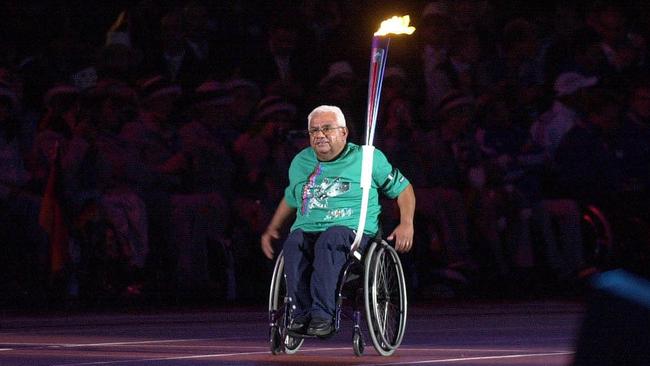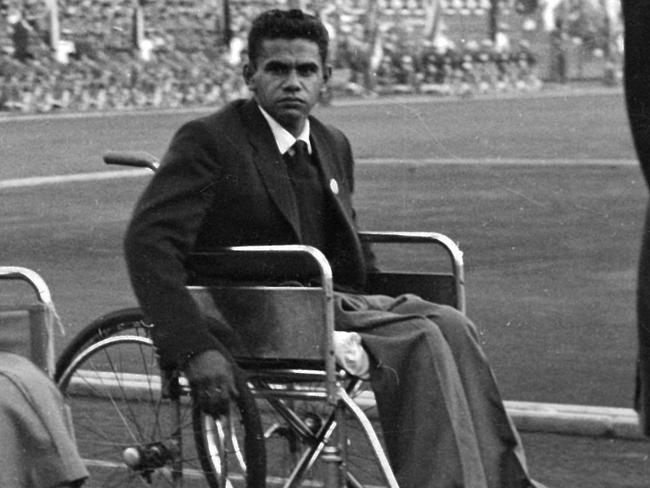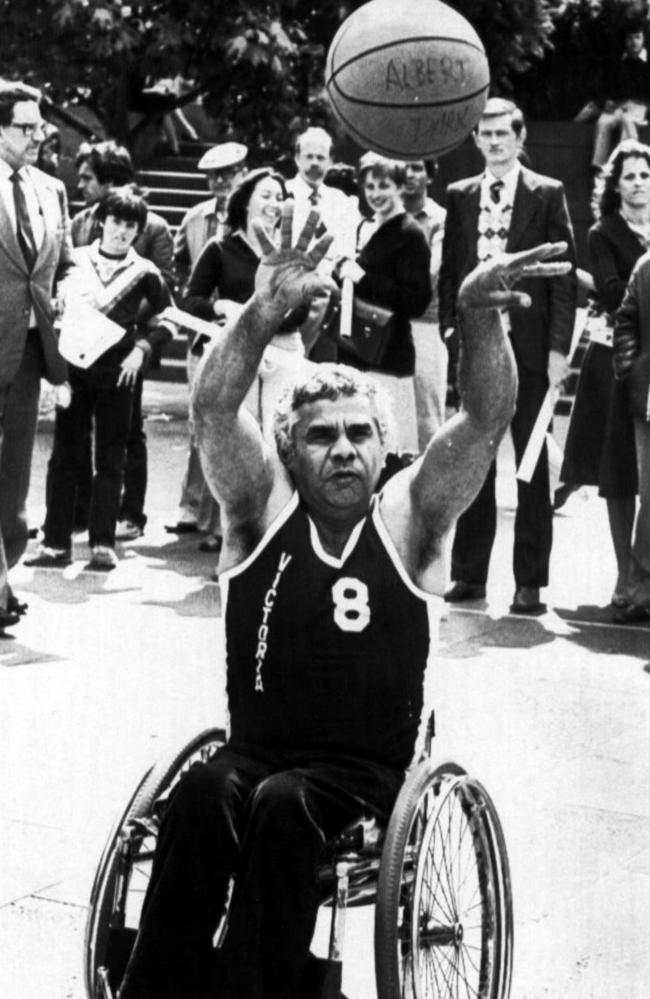Kevin Coombs was a sporting legend who changed people’s lives
Playing basketball in a wheelchair, Kevin Coombs went to five Paralympics and rolled in to Stadium Australia with the torch in 2000.

OBITUARY
Kevin Richard Coombs
Athlete. Born Swan Hill, Victoria, May 30, 1941; died Melbourne, October 5, aged 82.
When Kevin Coombs was five, his mother died. Aged 12, he was shot in the back and spent the rest of his life in a wheelchair. But when he came to write about it all he titled his book A Fortunate Accident – such an insight into an unconquerable spirit.
Either event might have cast long shadows over a life from which others might not have emerged. Coombs shortened the shadows and got on with it, and he helped changed his country along the way.
As part of his rehabilitation while being treated at Melbourne’s Austin Hospital, he chanced upon an early wheelchair basketball program, taking to it like a platypus to water. It proved to be good timing.
Wheelchair basketball had started in California a decade earlier. The game was already popular, and, plenty of young American soldiers returned from World War II having been rendered paraplegic. At the same time, neurologist Ludwig Guttmann – who had escaped Nazi persecution and moved to Oxford in 1939 – was organising games in Britain for soldiers with spinal cord injuries. These evolved into the Paralympics.
By the time Coombs was in his late teens his ball skills were refined, as was his ability to effortlessly move about the court.

In 1960, as a precursor to the first Paralympic Games in Rome, Coombs took part in the inaugural Australian championships. He was picked for Rome and would compete in four more Paralympics, captaining the team in New Zealand in 1974, when he won a silver medal. He was noted for his passing and shooting accuracy.
They weren’t in sports wheelchairs, just in the 44kg chairs they used day-to-day and had lugged with them.
As the game and equipment evolved, Coombs was there all the way, winning gold medals at the Far East and South Pacific Games for the Disabled in 1977 and 1982, and coaching the Victorian junior team to a gold medal in 1993.
He carried the torch in both the 2000 Sydney Olympics and Paralympics, bearing it into Stadium Australia. Nine streets there are named after sporting greats – Herb Elliott, Marjorie Jackson, Murray Rose, Shirley Strickland, Rod Laver and Shane Gould among them. Kevin Coombs Ave is named after a sports hero who worked harder than most.

Long before there were calls for a voice, Coombs was one. He was awarded a Medal of the Order of Australia in the 1983 Queen’s Birthday list in recognition of service to sport for the disabled and to Aboriginal welfare.
He worked diligently for his people, with a career in Victoria’s Department of Human Services where he set up the Koori Hospital Liaison Officer program while working with various alcohol and drug programs.
Coombs was born in Swan Hill, Victoria, to a large Aboriginal family and grew up at Balranald, NSW, just on the northern banks of the Murray.
He always took responsibility for the incident that changed his life: “I was shot in the back by another Aboriginal fella. We were out shooting rabbits. Like a fool I left a bullet in my gun.” Another boy picked it up and fired it. An uncle with a car came to take him to hospital, 60km away and with 16 farm gates on the way. “He wasn’t opening them up, he drove straight through them – boom, boom, boom.” At the hospital the uncle donated a pint of blood. He was “a great man” who joked that he wanted that pint of blood back.
At a welcome function for his team at Windsor Castle, Coombs presented Prince Charles with a woodchop racing axe, telling him he could swing it at some of the estate’s trees. Years later they met again and this time Coombs presented the future king with an Akubra, saying “just as well you’ve got those ears, brother”.
Coombs always valued the support of other great Aboriginal Australians including AFL great Syd Jackson, civil rights pioneer Charles Perkins, and Doug Nicholls, the first to be knighted and who later was appointed governor of South Australia.
It was confirmed just last year how courage has run in Coombs blood for generations. A South Australian man found a World War I British War Medal in a shed, engraved with the name Alfred (Jack) Coombs. He restored it, tracked the family down through the Swan Hill RSL and drove to Melbourne to present it to Jack’s grandson, Kevin.
The family was “blown away” to have the medal, but it reminded Coombs of an old injustice. The soldier settlement program gave – mostly dodgy – blocks of land to returned vets.
“Well, we’re still waiting for the land,” he said last year.





To join the conversation, please log in. Don't have an account? Register
Join the conversation, you are commenting as Logout